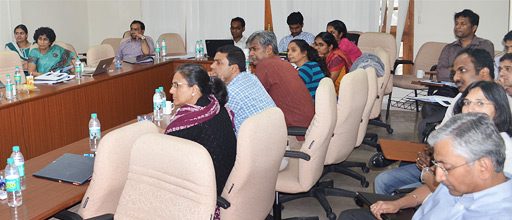
George Institute organizes training symposium to train early and mid-career public scientists in public health research methods
Recognizing the shortage of public health research professionals in the country, the George Institute for Global Health, India has undertaken a training program aimed at increasing the research capacity of early and mid-career health researchers with a particular focus on public health research methods, called “Practical Research 2013”. This is part of the institution’s overall objective of contributing to the development of public health research capacity in India.
"Given that public health schools are few in India and there is a huge need of public health research, there is a need to develop research capacity amongst clinicians and other health workers, which can impact public health," said Dr Pallab Maulik, Deputy Director and Head of Research and Development at the George Institute for Global Health.
Public health research entails having a comprehensive knowledge about many aspects of research – epidemiology, biostatistics, health economics, qualitative research, besides specific knowledge about diseases. One need not be an expert in every aspect, but definitely one needs to have basic concepts about each and an awareness of the need for each aspect. For example, a clinician may know his area of expertise, eg mental health and have a idea about the other core public health research areas outlined above to develop a project in collaboration with key public health specialists.
"The aim of this academic program was to provide that basic, but yet comprehensive awareness about key areas of public health research and was aimed towards clinicians and allied health researchers working in the area of public health," Dr. Maulik added.
The shortage of public health professionals in this country can be met either by training existing health workers in public health research methods by providing brief outlines and conceptual knowledge about public health research, as was the goal of the training program organized, or by giving regular formal public health training as part of definite public health degree courses.
The symposium will run from the 2nd to the 5th of December. Topics covered in the symposium include epidemiology, biostatistics, qualitative research, health economics, research funding and management, and career development.
The teaching faculty for this symposium is comprised of experienced international and local researchers from The George Institute, University of Sydney, University of Oxford, and the University of Hyderabad.
There were about 30 internal and external attendants. The external group had representatives from a number of national institutions across the country such as:
- NIMS, Hyderabad
- Osmania Medical College, Hyderabad
- University of Hyderabad; AIIMS, Patna
- SCARF, Chennai
- IIPH, Hyderabad
- Department of Health, Government of Andhra Pradesh
- BITS Pillani, Hyderabad
The program was funded largely by intramural funds of the institution and was also supported by some funds from ICMR.
Attendance of the full symposium will provide participants with a broad practical understanding of key elements of clinical and public health research, as well as some helpful tips on developing a career in these areas. A certificate of completion will be provided to attendees.



